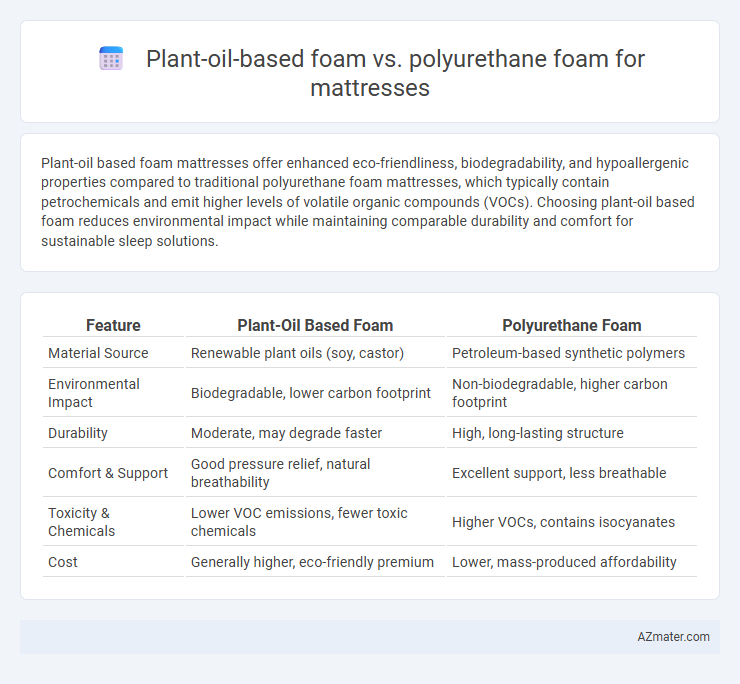Plant-oil based foam mattresses offer enhanced eco-friendliness, biodegradability, and hypoallergenic properties compared to traditional polyurethane foam mattresses, which typically contain petrochemicals and emit higher levels of volatile organic compounds (VOCs). Choosing plant-oil based foam reduces environmental impact while maintaining comparable durability and comfort for sustainable sleep solutions.
Table of Comparison
| Feature | Plant-Oil Based Foam | Polyurethane Foam |
|---|---|---|
| Material Source | Renewable plant oils (soy, castor) | Petroleum-based synthetic polymers |
| Environmental Impact | Biodegradable, lower carbon footprint | Non-biodegradable, higher carbon footprint |
| Durability | Moderate, may degrade faster | High, long-lasting structure |
| Comfort & Support | Good pressure relief, natural breathability | Excellent support, less breathable |
| Toxicity & Chemicals | Lower VOC emissions, fewer toxic chemicals | Higher VOCs, contains isocyanates |
| Cost | Generally higher, eco-friendly premium | Lower, mass-produced affordability |
Introduction to Plant-Oil Based and Polyurethane Foams
Plant-oil based foam, derived from renewable natural oils such as soy or castor, offers an eco-friendly and sustainable alternative to traditional polyurethane foam used in mattresses. Polyurethane foam is a petroleum-based product known for its durability, support, and affordability, but it has a higher environmental impact due to fossil fuel dependency. Plant-oil based foams reduce carbon footprint and volatile organic compound (VOC) emissions, contributing to healthier indoor air quality and improved mattress sustainability.
Composition and Raw Materials
Plant-oil based foam mattresses primarily use natural oils such as soy, castor, or palm oil in their composition, replacing a significant portion of petroleum-derived polyols found in traditional polyurethane foams. These bio-based polyols enhance sustainability by reducing reliance on fossil fuels and incorporating renewable resources into the foam matrix. Polyurethane foams, on the other hand, are synthesized mainly from petrochemical raw materials like polyols and isocyanates, resulting in a more chemically intensive production process compared to plant-oil derived alternatives.
Environmental Impact and Sustainability
Plant-oil based foam significantly reduces dependency on fossil fuels compared to traditional polyurethane foam, lowering carbon emissions during production. Biodegradability and renewable raw materials contribute to enhanced sustainability, making plant-oil foam a greener choice for mattress manufacturing. Waste reduction is achieved through eco-friendly disposal options, addressing the environmental challenges posed by polyurethane foam's persistence in landfills.
Manufacturing Process Comparison
Plant-oil based foam uses renewable oils such as soy or castor oil as key raw materials, incorporating bio-polyols through a less energy-intensive and lower-VOC manufacturing process compared to conventional polyurethane foam. Polyurethane foam manufacturing relies heavily on petrochemical-based polyols and isocyanates, requiring higher energy input and producing greater volatile organic compound emissions. The plant-oil foam process promotes sustainability by reducing dependence on fossil fuels and enabling more eco-friendly chemical reactions during foam formation.
Comfort and Support: Performance Metrics
Plant-oil based foam offers enhanced breathability and pressure relief with a softer initial feel, promoting cooler sleep and reducing motion transfer compared to traditional polyurethane foam. Polyurethane foam provides firmer support and higher density variations, delivering increased durability and superior edge support for heavier sleepers. Performance metrics such as indentation force deflection (IFD) and density ratings typically measure plant-oil foams around 20-30 IFD with densities of 2.0-2.5 lbs/ft3, while polyurethane foams range from 25-40 IFD and densities up to 3.5 lbs/ft3, affecting both comfort and long-term support.
Durability and Longevity
Plant-oil based foam offers enhanced durability through its natural resistance to breakdown and moisture, extending mattress lifespan compared to traditional polyurethane foam. Polyurethane foam, while initially supportive, tends to degrade faster due to chemical composition, leading to sagging and reduced firmness over time. Mattresses made with plant-based foam demonstrate superior longevity by maintaining structural integrity and comfort levels for several years longer than conventional polyurethane alternatives.
Health and Safety Considerations
Plant-oil based foam mattresses significantly reduce exposure to harmful volatile organic compounds (VOCs) and toxic chemicals commonly found in traditional polyurethane foam, promoting better indoor air quality and reducing allergy risks. These foams are typically free from flame retardants and other hazardous additives, enhancing safety for sensitive individuals, including children and those with respiratory conditions. CertiPUR-US(r) certification often validates the health and safety standards of plant-oil foams, ensuring low emissions and safer sleep environments.
Cost and Market Availability
Plant-oil based foam mattresses typically have higher initial costs due to the use of sustainable, bio-based raw materials, but they attract eco-conscious consumers willing to invest in green alternatives. Polyurethane foam mattresses dominate the market with lower production expenses, resulting in more affordable prices and widespread availability across various retailers. Demand for plant-oil foams is growing steadily, yet polyurethane remains the more accessible and cost-effective option for most buyers.
Consumer Preferences and Trends
Plant-oil based foam mattresses attract eco-conscious consumers prioritizing sustainability, biodegradable materials, and reduced VOC emissions compared to traditional polyurethane foam. Market trends indicate a rising demand for plant-derived foams due to their hypoallergenic properties and lower environmental impact, aligning with growing preferences for green products. Consumer reviews highlight improved breathability and comfort in plant-oil foam mattresses, driving increased adoption despite slightly higher prices than conventional polyurethane options.
Future Prospects in Mattress Foam Technologies
Plant-oil based foams, derived primarily from renewable resources such as soy and castor oil, are increasingly favored in mattress manufacturing due to their reduced environmental impact and potential for enhanced biodegradability compared to traditional polyurethane foams. Advances in bio-polyol chemistry and foam formulation are improving durability, support, and comfort levels of plant-oil foams, positioning them as competitive alternatives that meet evolving consumer demand for sustainability. The future of mattress foam technology will likely emphasize hybrid blends combining bio-based ingredients with engineered performance enhancements to optimize both ecological footprint and sleep quality.

Infographic: Plant-oil based foam vs Polyurethane foam for Mattress
 azmater.com
azmater.com